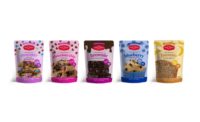Cloud kitchens—also known as ghost kitchens—continue to pose an intriguing business opportunity for the food industry. This extends to bakery, with potential in direct-to-consumer delivery or click-and-collect for products like fresh breads, sweet goods, desserts, and more. Bakery companies—and other food companies seeking to enter this market—could also partner with retailers and/or foodservice companies to provide these services for their existing customer base.
According to a report released by Research and Markets in August, the global cloud kitchen market is projected to reach $139.4 billion by 2028, registering a CAGR of 12.4% from 2021 to 2028.
In addition to spearheading their own cloud kitchen initiatives, bakeries can partner with emerging or existing cloud kitchens to provide essential snack and bakery items.
A new cloud kitchen enterprise needs to build buzz, and initiatives led by celebrities immediately bring a platform for consumer engagement. One recent example is Trejo’s Tacos Chicago, led by renowned actor Danny Trejo. Trejo’s Tacos operates out of Kitchen United, a ghost kitchen in the heart of downtown Chicago.
Kitchen Untied is home to several other cloud businesses, including several spanning sandwiches, tacos/wraps, and pizza, as well as desserts like ice cream sandwiches and cookies.
Another cloud kitchen operator, CloudKitchens, operates across multiple U.S. cities, partnering with everyone from small startups like industry entrepreneurs to national food businesses.
During the COVID-19 pandemic, cloud kitchens thrived due to their focus on carry-out and delivery. Cloud kitchens also provide an easier entry to the foodservice market, including for consumer testing and product trial. This sales channel will continue to grow and mature as we move forward.
In August, The Wendy’s Company and REEF announced a new commitment to open and operate 700 delivery-only kitchens over the next five years across the U.S., Canada, and the United Kingdom. REEF is a provider of mobility and logistics solutions, as well as “neighborhood kitchens.”
Retailers have also entered this market via strategic partnerships. In early August, Kroger and Kitchen United announced a partnership to provide Kroger customers with on-demand carry-out and delivery options.
A key part of the success for cloud kitchens is customer accessibility and ease of ordering. In a release distributed by Kroger, Dan De La Rosa, group vice president, fresh merchandising, noted: “Our customers’ appetite for fresh, on-demand meals continues to accelerate, and we remain focused on offering new and innovative products that provide anything, anytime, anywhere. Our partnership with Kitchen United taps into restaurants’ growing use of off-premise kitchen space to increase customers’ access to their favorite foods.”
The restaurant kitchens run by Kitchen United at participating Kroger locations will feature up to six local, regional, or national restaurant brands. Customers can place orders via website, app, or specialty kiosk.
In that same release, Atul Sood, chief business officer, Kitchen United, said: “We are proud to have launched a number of successful ghost kitchen centers across the country, and now we are applying our experience and taking steps to expand in non-traditional ghost kitchen formats such as retail shopping centers and food halls like our newest kitchen center location in Chicago alongside our efforts with Kroger.
For more on the topic of cloud or ghost kitchens, see “Cloud kitchen bakery opportunities” for a look at the technology necessary to facilitate on-demand, internet-based ordering and fulfillment.





